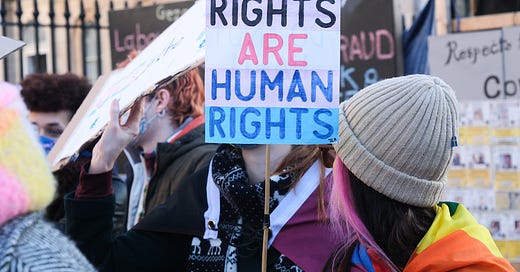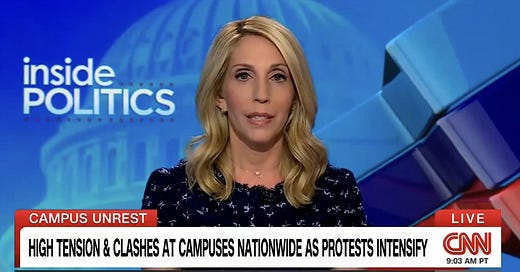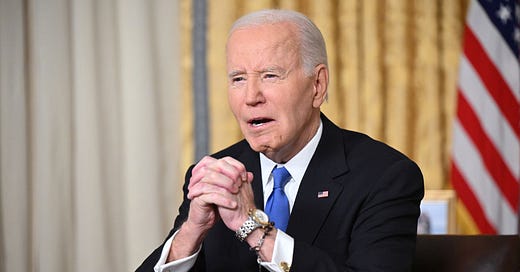
Life is full of uncertainties, but a few things are thuddingly predictable. The sun will rise and set. Humans will breathe in and out. And the New York Times will devote acres of sympathetic space to transphobes.
The Times’ transphobia problem is no secret at this point. Over and over again, the paper has published articles cloaked in seemingly well-meaning “concern” about the “complexities” of gender identity, especially in children. Over and over again, people have pointed out the substantial flaws in the Times’ reporting. And over and over again, the Times has seemingly refused to listen.
Sunday brought yet another installment in this wretched series—a lengthy story by Katie J.M. Baker which the Times placed above the fold on its Monday front page. This time, the paper is asking us to feel bad for parents—all of whom, we are repeatedly assured, identify as decent liberals—who are so traumatized by their children’s exploration of gender identity at school that they have aligned themselves with the far-right anti-trans movement. What a moving tale!
The trouble with the article starts right at the beginning.
Baker opens on Jessica Bradshaw, a Southern California mom who discovers that her child is now identifying as a boy at school—and that the school had been allowing him to do this for months without her knowledge.
Sound the alarm! From the Times (emphasis mine):
“There was never any word from anyone to let us know that on paper, and in the classroom, our daughter was our son,” Mrs. Bradshaw said.
The Bradshaws have been startled to find themselves at odds with the school over their right to know about, and weigh in on, such a major development in their child’s life — a dispute that illustrates how school districts, which have long been a battleground in cultural conflicts over gender and sexuality, are now facing wrenching new tensions over how to accommodate transgender children.
The Bradshaws accepted their teenager’s new gender identity, but not without trepidation, especially after he asked for hormones and surgery to remove his breasts. Doctors had previously diagnosed him as being on the autism spectrum, as well as with attention deficit hyperactivity disorder, PTSD and anxiety. He had struggled with loneliness during the pandemic, and, to his parents, seemed not to know exactly who he was yet, because he had repeatedly changed his name and sexual orientation.
Given those complexities, Mrs. Bradshaw said she resented the fact that the school had made her feel like a bad parent for wondering whether educators had put her teenager, a minor, on a path the school wasn’t qualified to oversee.
“It felt like a parenting stab in the back from the school system,” she said. “It should have been a decision we made as a family.”
The student, now 16, told The New York Times that his school had provided him with a space to be himself that he otherwise lacked. He had tried to come out to his parents before, he said, but they didn’t take it seriously, which is why he asked his school for support.
“I wish schools didn’t have to hide it from parents or do it without parental permission, but it can be important,” he said. “Schools are just trying to do what’s best to keep students safe and comfortable. When you’re trans, you feel like you are in danger all the time. Even though my parents were accepting, I was still scared, and that’s why the school didn’t tell them.”
The nastiness of the line that the Times is pushing is neatly contained in these paragraphs. So is the hollowness. The Bradshaw parents are cast as decent people who accept their son’s new identity, but are merely dismayed that the school didn’t reach out to them over a situation that contains so many “complexities” and “wrenching tensions.” But when it comes time to ask the child at the center of this very complicated situation, he is clear: he tried to talk about this with his parents, but they “didn’t take it seriously.” That is, they made him feel like this wasn’t something he could do with their full support and understanding, so he didn’t tell them. (Also, there is a reference to his desire to have hormones and surgery, but the piece is clear that his parents aren’t letting that happen—so we are only talking about someone transitioning socially.)
Given what we read here, this kid had good reason to be wary, because not only did his mother go to the leading news outlet in America to discuss how devastating it was that her child was out at school, but she also misgendered him. “On paper, and in the classroom, our daughter was our son,” she said. He wasn’t her son “in his life” or “in reality,” but merely “on paper” and “in the classroom.” This is what you might call a big giveaway. But despite this, the implication of the Times story is that there is something wrong with the school’s reluctance to inform Jessica Bradshaw—or, at least, that this is a topic worthy of serious debate.
The rest of the piece carries on in a similar vein, with a repeated focus on parents who swear that they are good liberals who suddenly find themselves aligned with Republicans because of how difficult and complicated this all is. From the piece (emphasis mine):
But how schools should address gender identity cuts through the liberal and conservative divide. Parents of all political persuasions have found themselves unsettled by what schools know and don’t reveal.
Mrs. Bradshaw said she wouldn’t align herself with Republican lawmakers who sought to ban L.G.B.T.Q. rights, but she also felt as though her school’s policy left no room for nuance.
“It is almost impossible to have these discussions,” Mrs. Bradshaw said. “There is no forum for someone like me.”
Other self-described liberal parents said they registered as independents or voted for Republican candidates for the first time as a result of this issue. Although they haven’t sued, some have retained lawyers affiliated with the largest legal organization on the religious right to battle their children’s schools.
Baker makes sure to carefully air the “other side” of this story—facts about how hard it is to be a trans kid, quotes from teachers and parents who emphasize that the home is not always a place of safety for queer children—but she keeps coming back to this same group of parents who, we are told, are loving but simply confused and searching for answers. They are still given the benefit of the doubt even when that search happens to place them in the company of blatant transphobes. From the piece (emphasis mine):
There is a network of internet support groups for “skeptical” parents of transgender children, some with thousands of registered members. Detractors have called the groups transphobic, because some want to ban gender-affirming care for minors, or have amplified the voices of people who call transgender advocates “groomers.” [Ed. note: yeah, sounds pretty goddamn transphobic to me!]
But members say these groups are some of the only places to ask questions and air their concerns.
One Saturday morning shortly before Christmas, a meeting of one such support group was held in Westchester County, just north of New York City. Sitting in a circle in a member’s living room, 12 mothers and one father spoke of the ways they said they had been sidelined by their children’s schools.
[…]
“It’s just been such a hard thing to navigate, because on the one hand, I’m dealing with my very extreme liberal values of individuality, freedom, expression, sexuality, wanting to support all of this stuff,” said a tearful mother. “At the same time, I’m afraid of medicalization. I’m afraid of long term health. I’m afraid of the fact that my child might change their mind.”
As other parents nodded in agreement, the lone father in the room said: “It’s politically weird to be a very liberal Democrat and find yourself shoved in bed with, like, the governor of Texas. Am I supposed to listen to Tucker Carlson?”
There is a useful word to describe someone who thinks of themselves as liberal and open-minded but then joins forces with far-right bigots when their child begins exploring their gender identity. That word is “transphobe.”
But wait, there’s more (emphasis mine):
Since 2020, at least 11 lawsuits alleging that these policies violate parental rights have been filed against school districts by parents who are represented by conservative legal groups, such as the Alliance Defending Freedom, an organization with a long history of backing cases targeting the rights of gay and transgender people.
Three parents, all self-described liberals, told The Times that support groups had connected them with a legal group affiliated with the Alliance, called the Child and Parental Rights Campaign, which was founded in 2019 with the mission of defending children and parents against “gender identity ideology,” according to its nonprofit disclosure forms. Its president has spoken at conferences about the “existential threat to our culture” posed by the “transgender movement.”
I’m going to go out on a limb and suggest that, if your parents hooked up with a hardcore anti-trans legal group because your school didn’t tell them you were using different pronouns, the school was probably right not to tell them.
The story ends on this note (emphasis mine):
The son of Mrs. Bradshaw, the mother in Southern California, said he has empathy for parents who find it hard to accept that their children are transgender. But he also expressed frustration.
“When parents say they need time or patience it can feel kind of like an excuse for them to keep misgendering you,” he said. “It feels like they are grieving for someone who is not dead, and it makes you feel like you’re not good enough.”
His mother reiterated that she loves her child no matter his gender, but voiced her own frustrations.
“The school is telling me that I have to jump on the bandwagon and be completely supportive,” Mrs. Bradshaw said. “There is only so much and so far that I’m willing to go right now and I would hope that, as a parent, that would be my decision.”
Ah yes, both sides of this difficult issue. On the one hand, the son who wishes that parents would stop misgendering people like him because it is harmful to his emotional well-being, and on the other hand, the mother who is super-duper-accepting, but just doesn’t want to be “completely supportive” of her child. What’s the world to do about this nuanced situation?
There is an easy way to expose the poison at the heart of this story. I just want you to go through the preceding paragraphs and replace the word “transgender” with the word “gay.” Imagine that the New York Times wrote a lengthy front-page story that opened on a mother who was distraught that her child had come out as gay at school without her knowledge. Imagine that the Times used that anecdote to anchor an entire piece about the supposed “complexities” of children who are closeted at home but not at school. Imagine that it cast a sympathetic eye on a group of parents who all swore they were liberals who loved their children but found themselves in an alliance with far-right homophobes who wanted gay people removed from the face of the earth—simply because a school had allowed their kids to come out without their knowledge.
It’s very, very hard to imagine the Times running a piece like that in 2023. The notion that teachers should forcibly out gay children to their parents would be deemed laughably beyond the pale. But, in the world the Times appears to occupy, there is something different about trans identity. There is some sort of danger in a child merely exploring their gender—not getting surgery, remember, just changing their pronouns or their name. There is something wrong enough about it that it merits a long front-page article about how hard this issue is. When it comes to trans people, there are two sides to the story.
The reason that the Times feels comfortable doing this sort of piece about trans kids and their bigoted parents is simple: the Times is hooked on transphobia. It is institutionally committed to treating trans identity not as a basic human right, but as a challenging problem to be solved. It is mainstreaming some of the most noxious elements in our society. And it seems quite happy to keep on doing so.


















As usual, great piece on this topic. This whole thing is maddening. Every single day, I wake up and some mainstream news outlet (NYT, The Atlantic, Washington Post, etc.) will have a new "Look, we're just concerned about the kids!!!" piece. I hate it. I hate how much it gets to me. I do appreciate your push-back on them, though. Thank you, as always, for fighting the good fight.
It boggles the mind how much faux handwringing coverage being trans is getting in the NYT. I'm beginning to wonder if the Times has a Brit in their editorial section.